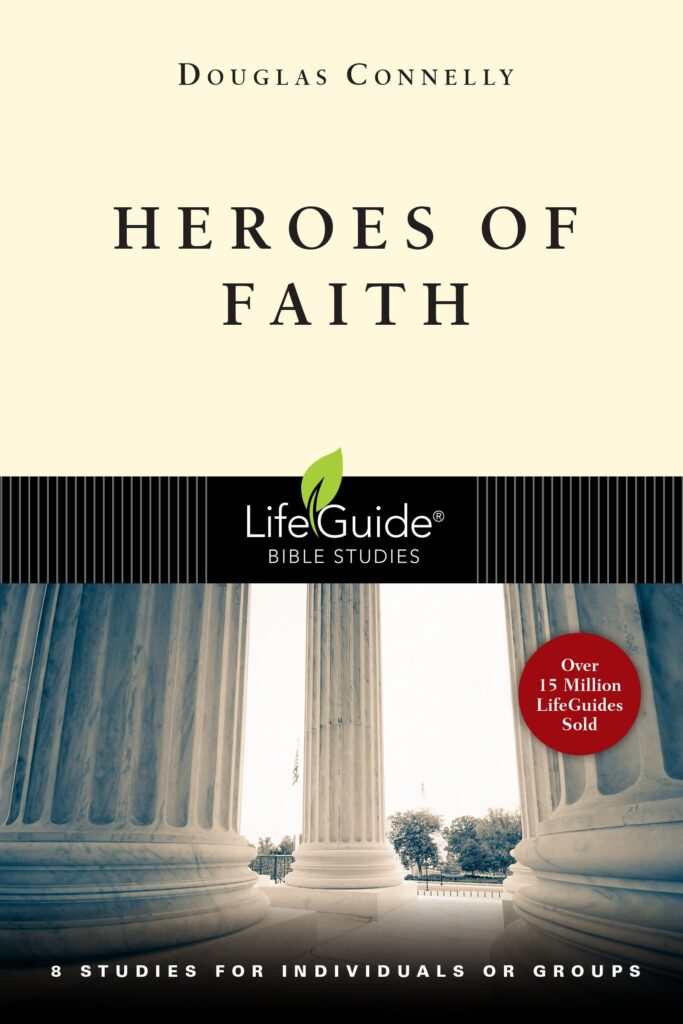Click here to return to Blog Post Intro
Unlikely Heroes: Ordinary People with Extraordinary Faith by Daniel Lockwood

Often, the people you least expect respond to the grace of God. Of all the unlikely men and women of faith, perhaps the character with the most unexpected response of faith in God is Rahab the harlot.
Hebrews 11 makes two references to Israel’s conquest period: the destruction of Jericho’s walls (Hebrews 11:30) and the faith of Rahab in hiding Joshua’s spies (Hebrews 11:31).
In Joshua 2, Rahab’s story provides candid insight into her faith, where she reveals four steps of her spiritual transformation:
8 Before the spies lay down for the night, [Rahab] went up on the roof 9 and said to them, “I know that the Lord has given you this land and that a great fear of you has fallen on us, so that all who live in this country are melting in fear because of you. 10 We have heard how the Lord dried up the water of the Red Sea for you when you came out of Egypt, and what you did to Sihon and Og, the two kings of the Amorites east of the Jordan, whom you completely destroyed. 11 When we heard of it, our hearts melted in fear and everyone’s courage failed because of you, for the Lord your God is God in heaven above and on the earth below.
| Rahab’s Heart | Yahweh’s Character |
| What she knew (Joshua 2:9) | The purpose of Yahweh |
| What she heard (Joshua 2:10) | The power of Yahweh |
| What she felt (Joshua 2:11a) | The fear of Yahweh |
| What she believed (Joshua 2:11b) | The lordship of Yahweh |
Rahab’s Bargain
Rahab went out on a limb for Joshua’s two spies then pleads with them, “Please, repay my kindness with kindness. Don’t let us perish.”
The spies agreed under these three conditions:
- Don’t reveal anything about the spies, or the deal is off.
- Keep the scarlet cord hanging from her window.
- Most importantly, keep everyone in the house.
Rahab becomes a child of God, and her greatest achievement is this: faith displays concrete evidence in her life. Rahab demonstrates her faith by the choices she makes, by the acts she performs, and by her allegiance to the God she embraces.
Rahab’s Spiritual Resume
| Rahab’s Resume | Principle of Faith |
| Rahab’s Work Experience | Living by faith is available to anyone regardless of their merit or reputation. |
| Rahab’s Greatest Achievements | Living by faith produces concrete evidence. |
| Rahab’s Most Challenging Decisions | Living by faith requires clear-headed ethical thinking. |
| Rahab’s Compensation | Living by faith issues in heavenly—and sometimes earthly—blessing. |
Rahab ultimately becomes a link in the genealogy of King David. Matthew tells us that Rahab (the one time in the New Testament she is not called a harlot) marries Salmon and becomes the mother of Boaz, who marries Ruth the Moabite (Matthew 1:5).
A Great Cloud of Witnesses: A Study of Those Who Lived by Faith by Trillia Newbell

Rahab lied. No need to mince words or pretend it’s not in the text. Rahab lied to the king to protect the spies.
Nowhere where Rahab is mentioned in the Bible is there any attention brought to her lie (Hebrews 11:31 & James 2:25). Her faith and obedience are the highlights of her life. Those aspects of her life are remembered and should be emulated.
How we treat others proves our faith to be true. At least that’s what James wrote as he referenced Rahab in James 2:24-26, showing an example for what it looks like to put our faith into action.
24 You see that a person is considered righteous by what they do and not by faith alone. 25 In the same way, was not even Rahab the prostitute considered righteous for what she did when she gave lodging to the spies and sent them off in a different direction? 26 As the body without the spirit is dead, so faith without deeds is dead.
Rahab’s faith in God, her fear of the Lord, and her belief in the promises of God led her to act counterculturally in every way. As we read Rahab’s amazing story about her strength and her faith in the midst of terrifying circumstances—her city is about to be destroyed!—let’s thank the Lord that salvation is by grace alone, through faith alone.

Rahab used a scarlet rope, which seems symbolic of the Lamb of God who would one day take away the sin of the world (John 1:29). Rahab was “passed over” and spared because of the rope foreshadowing the Lord’s work of forgiveness of our sin because of the death of Jesus. Unlike Rahab, there isn’t anything we must do or sacrifice or give up, for Jesus did what we could not do.
Heroes of Faith by Douglas Connelly

From Joshua 2:4-6, “But [Rahab] had taken the two men and hidden them. She said, ‘Yes, the men came to me, but I did not know where they had come from. At dusk, when it was time to close the city gate, they left. I don’t know which way they went. Go after them quickly. You may catch up with them.’ (But she had taken them up to the roof and hidden them under the stalks of flax she had laid out on the roof.)”
Rahab’s lie is the key ethical dilemma of the story. Some argue that Rahab should have told the truth and trusted God for the results. Others think that a higher moral issue was involved—the protection of God’s representatives—and that the lie was justified to thwart the evil planned against them.
The writer of Hebrews saw Rahab’s act as an act of faith because she was convinced that God would give Israel victory over Jericho. She fully believed that God would do what he promised he would do.
Rahab’s actions—hanging a scarlet-colored rope from the window of her house and keeping the escape of the spies a secret—showed that her faith was genuine. She had confessed a level of faith to the spies but her actions prove that it was more than just words.
Joshua 6:25 tells us the end of the story, “But Joshua spared Rahab the prostitute, with her family and all who belonged to her, because she hid the men Joshua had sent as spies to Jericho—and she lives among the Israelites to this day.”
Rahab is mentioned two other times in the New Testament:
- James points to her as a model of believers who demonstrate true faith by their works, even declaring that she was “considered righteous for what she did” (James 2:25).
- In the genealogy of Jesus (Matthew 1:5), it notes one of Jesus’ ancestors was a man named Salmon, who married Rahab, the former prostitute.
God’s Hall of Faith Speaks Today (Hebrews 11) by J. David Eshleman

Even though the people of Jericho believed they were about to be conquered by Israel’s God, they did not pray for deliverance. They feared God but had no faith in God. Rahab, a harlot who was at the bottom of the social ladder, had an unquestioning belief that Israel’s God was going to deliver Jericho into their hands. God frequently uses persons our society rejects to carry out his plans.
Jesus said, “I tell you, the tax collectors and prostitutes are entering the kingdom of God ahead of you” (Matthew 21:31).
While operating a brothel had possibly estranged her from her loved ones, Rahab was concerned about their safety as well as her own. What a picture of forgiving love.
Do you feel you could never be part of God’s Hall of Faith because of your family background or sinful lifestyle? Rahab shows how God can use anyone. We are all sinners. There is no one righteous, not even one (Romans 3:10).
Thank God for what He has done for you, not because you are good but because He loves you and longs for your allegiance. Rahab is included in God’s Hall of Faith to encourage us when we think we are too sinful for God to redeem.
